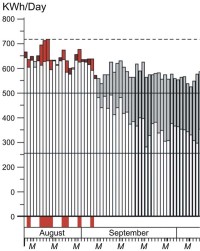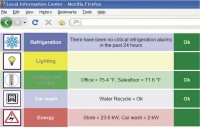 Dan Radford, Managing Director of Parasense Ltd recognises that concerns over ever-spiralling energy budgets and carbon footprint reduction are just as acute for convenience stores and forecourts as they are for supermarkets, and celebrates the arrival of a new solution designed specifically for them.
Dan Radford, Managing Director of Parasense Ltd recognises that concerns over ever-spiralling energy budgets and carbon footprint reduction are just as acute for convenience stores and forecourts as they are for supermarkets, and celebrates the arrival of a new solution designed specifically for them.
Convenience stores face the same barriers to making a profit as supermarkets do. They also face a unique set of challenges of their own. The primary and most obviously cited difficulty is around price because price rises to protect profit levels, even when times are tough, have to be a last resort. Indeed, Marks and Spencer’s Stuart Rose recently admitted he’d actually reduced food prices despite the company’s 40% drop in profits. For convenience stores, this problem is magnified because their prices are higher to help offset the costs of ground rent in prime areas, so any price rise must be even more carefully considered.
Then there are the perils of the energy budget. Energy prices have been volatile and / or sky-high for some time now and there is renewed concern about the price of oil. Of course, one reason the energy budget is such a problem is that it takes up such a huge part of any store’s overheads. Any increases have a huge effect on profit levels, as do any reductions – and there only seem to be increases at the moment. The R22 phase-out will mean increased expense in refrigeration systems either through the replacement of plant or the increasing costs of using recycled R22 until the total ban comes into force in 2015. And even the weather seems to be conspiring against profit at the moment: the predicted long, hot summer will mean HVAC and refrigeration units will be working overtime to keep people and products cool.
 There have been energy monitoring solutions on the market for some time that can help reduce energy consumption and therefore the carbon footprint and the costs. However, these have not been a solution for convenience stores because while the investment might be extremely reasonable for the average supermarket and costs can quickly be recouped, for the average convenience store that is far from the case and the cost has been prohibitive.
There have been energy monitoring solutions on the market for some time that can help reduce energy consumption and therefore the carbon footprint and the costs. However, these have not been a solution for convenience stores because while the investment might be extremely reasonable for the average supermarket and costs can quickly be recouped, for the average convenience store that is far from the case and the cost has been prohibitive.
So where does that leave convenience stores? Until now, the answer has primarily been in staff education. Educate your staff to turn off the lights when they leave a room, turn off ovens overnight, check refrigerator temperatures regularly and it will pay dividends, they say. This is undoubtedly true. But what’s also true is that two months into the efficiency drive the posters will be part of the furniture and for every member of staff who is still vigilant there’ll be at least one who isn’t. In short, without constant awareness, the effects will only be short-lived.
But now there are solutions that give convenience stores and forecourts the same tools that supermarkets have had for a while in sophisticated packages that are tailored to their needs and their budget. One example is our new EcoLibrium system. It’s a modular system that minimises energy usage in heating, ventilation, air conditioning, lighting and refrigeration systems and monitors overall energy usage so further savings can be made. It has given energy savings of between 20% and 40% so has a significant impact on budget reduction.
 EcoLibrium performs in much the same way as the systems for the supermarkets. It monitors a store’s HVAC systems to maintain air quality and comfort levels while ensuring they are operating as efficiently as they can. It can even be set to maintain different levels on the sales floor and the back-of-house areas.
EcoLibrium performs in much the same way as the systems for the supermarkets. It monitors a store’s HVAC systems to maintain air quality and comfort levels while ensuring they are operating as efficiently as they can. It can even be set to maintain different levels on the sales floor and the back-of-house areas.
Lighting can be made similarly efficient. It can be programmed in 15 minute intervals so it is only on when you want it. It can also be programmed so the lights don’t come on at all on days when the store is closed. Motion sensors put an end to hoping staff remember to turn off lights when they leave a room while lighting sensors mean they only need be on when it’s necessary.
Refrigeration systems can be monitored to ensure food is kept safe but energy isn’t wasted. Using the system’s secure, online and easy-to-use interface, Headline News, owners can also be alerted when they start operating above the safe temperature or when refrigerant starts to leak. And if an engineer needs to be called, this can be done with one click of a mouse. Quick, convenient and a great way to monitor and report response times, first time fix rates and fixture availability.
 In fact any IP-addressable system can be monitored. For example, forecourt managers can be alerted automatically when the car wash’s water recycle has stopped working or the wax is about to run out – rather than by an irate customer when it just has.
In fact any IP-addressable system can be monitored. For example, forecourt managers can be alerted automatically when the car wash’s water recycle has stopped working or the wax is about to run out – rather than by an irate customer when it just has.
Convenience store owners face the same problems as supermarkets when it comes to managing the energy budget. Unfortunately, they haven’t had the same level of support to help solve the problems. Until now.
For more information on EcoLibrium from Parasense call 01452 724123 or email sales@parasense.co.uk




Comments are closed.